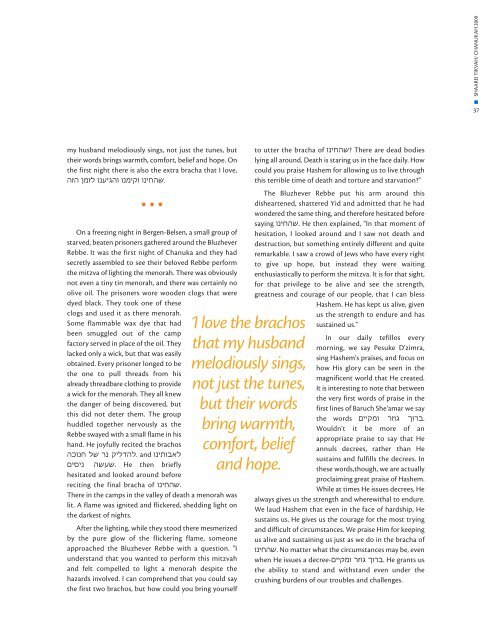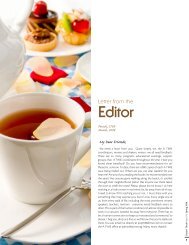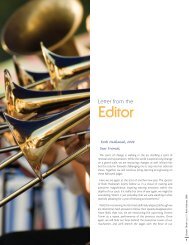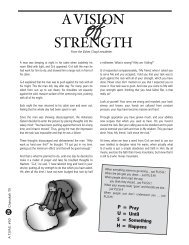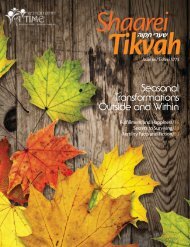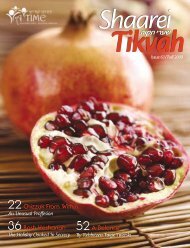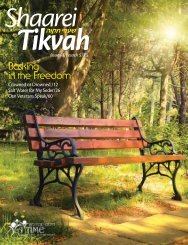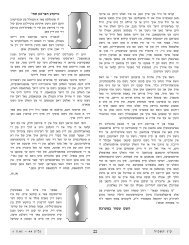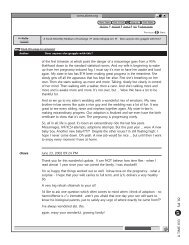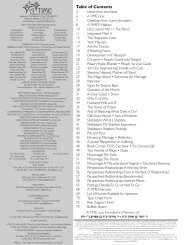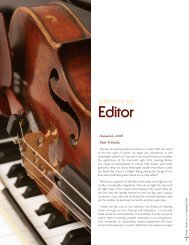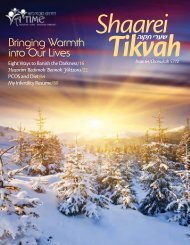Create successful ePaper yourself
Turn your PDF publications into a flip-book with our unique Google optimized e-Paper software.
SHAAREI TIKVAH/ CHANUKAH <strong>2009</strong><br />
37<br />
my husband melodiously sings, not just the tunes, but<br />
their words brings warmth, comfort, belief and hope. On<br />
the first night there is also the extra bracha that I love,<br />
.שהחינו וקימנו והגיענו לזמן הזה<br />
•••<br />
On a freezing night in Bergen-Belsen, a small group of<br />
starved, beaten prisoners gathered around the Bluzhever<br />
Rebbe. It was the first night of Chanuka and they had<br />
secretly assembled to see their beloved Rebbe perform<br />
the mitzva of lighting the menorah. There was obviously<br />
not even a tiny tin menorah, and there was certainly no<br />
olive oil. The prisoners wore wooden clogs that were<br />
dyed black. They took one of these<br />
clogs and used it as there menorah.<br />
Some flammable wax dye that had<br />
been smuggled out of the camp<br />
factory served in place of the oil. They<br />
lacked only a wick, but that was easily<br />
obtained. Every prisoner longed to be<br />
the one to pull threads from his<br />
already threadbare clothing to provide<br />
a wick for the menorah. They all knew<br />
the danger of being discovered, but<br />
this did not deter them. The group<br />
huddled together nervously as the<br />
Rebbe swayed with a small flame in his<br />
hand. He joyfully recited the brachos<br />
לאבותינו and .להדליק נר של חנוכה<br />
He then briefly .שעשה ניסים<br />
hesitated and looked around before<br />
.שהחינו reciting the final bracha of<br />
There in the camps in the valley of death a menorah was<br />
lit. A flame was ignited and flickered, shedding light on<br />
the darkest of nights.<br />
After the lighting, while they stood there mesmerized<br />
by the pure glow of the flickering flame, someone<br />
approached the Bluzhever Rebbe with a question. "I<br />
understand that you wanted to perform this mitzvah<br />
and felt compelled to light a menorah despite the<br />
hazards involved. I can comprehend that you could say<br />
the first two brachos, but how could you bring yourself<br />
I love the brachos<br />
that my husband<br />
melodiously sings,<br />
not just the tunes,<br />
but their words<br />
bring warmth,<br />
comfort, belief<br />
and hope.<br />
to utter the bracha of ?שהחינו There are dead bodies<br />
lying all around. Death is staring us in the face daily. How<br />
could you praise Hashem for allowing us to live through<br />
this terrible time of death and torture and starvation?"<br />
The Bluzhever Rebbe put his arm around this<br />
disheartened, shattered Yid and admitted that he had<br />
wondered the same thing, and therefore hesitated before<br />
saying .שהחינו He then explained, "In that moment of<br />
hesitation, I looked around and I saw not death and<br />
destruction, but something entirely different and quite<br />
remarkable. I saw a crowd of Jews who have every right<br />
to give up hope, but instead they were waiting<br />
enthusiastically to perform the mitzva. It is for that sight,<br />
for that privilege to be alive and see the strength,<br />
greatness and courage of our people, that I can bless<br />
Hashem. He has kept us alive, given<br />
us the strength to endure and has<br />
sustained us."<br />
In our daily tefillos every<br />
morning, we say Pesuke D'zimra,<br />
sing Hashem's praises, and focus on<br />
how His glory can be seen in the<br />
magnificent world that He created.<br />
It is interesting to note that between<br />
the very first words of praise in the<br />
first lines of Baruch She'amar we say<br />
.ברוך גוזר ומקיים the words<br />
Wouldn't it be more of an<br />
appropriate praise to say that He<br />
annuls decrees, rather than He<br />
sustains and fulfills the decrees. In<br />
these words,though, we are actually<br />
proclaiming great praise of Hashem.<br />
While at times He issues decrees, He<br />
always gives us the strength and wherewithal to endure.<br />
We laud Hashem that even in the face of hardship, He<br />
sustains us. He gives us the courage for the most trying<br />
and difficult of circumstances. We praise Him for keeping<br />
us alive and sustaining us just as we do in the bracha of<br />
No matter what the circumstances may be, even .שהחינו<br />
when He issues a גוזר ומקיים-decree .ברוך He grants us<br />
the ability to stand and withstand even under the<br />
crushing burdens of our troubles and challenges.


